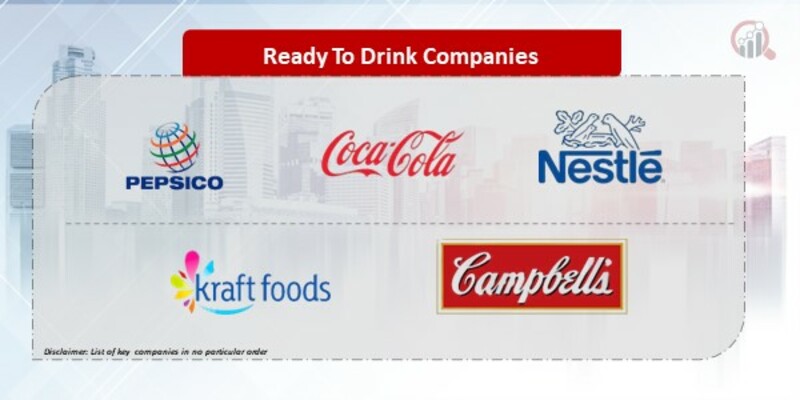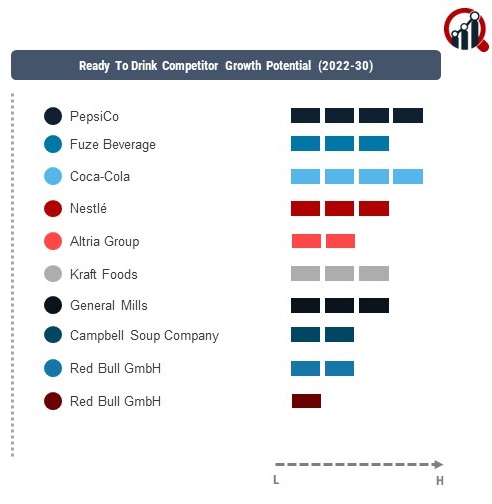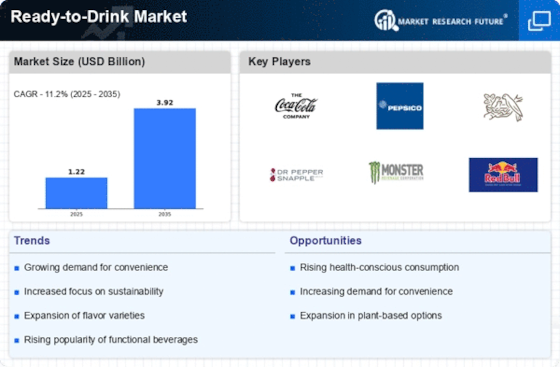Top Industry Leaders in the Ready To Drink Market

The ready-to-drink (RTD) market has experienced robust growth in recent years, fueled by changing consumer lifestyles and the demand for convenient, on-the-go beverage options. The competitive landscape of this market is characterized by a mix of well-established players and emerging companies, each contributing to the evolution of the RTD segment.
Key Players:
PepsiCo (U.S.)
Fuze Beverage (U.S.)
Coca-Cola (U.S.)
Nestlé (Switzerland)
Kraft Foods (U.S.)
Campbell Soup Company (U.S.)
Ocean Spray (U.S.)
Strategies Adopted:
The RTD market employ various strategies to maintain and enhance their competitive positions. Product innovation is a central focus, with companies continuously introducing new flavors, formulations, and packaging to cater to changing consumer preferences. Strategic partnerships with distributors, retailers, and other players in the supply chain ensure efficient distribution and availability of RTD products. Furthermore, marketing efforts emphasize brand visibility, product differentiation, and aligning with consumer trends, driving the adoption of RTD beverages.
Market Share Analysis:
The RTD segment involves considering several key factors. Brand recognition and consumer loyalty are critical determinants, as consumers often opt for familiar and trusted RTD brands. Distribution networks and partnerships with retailers significantly contribute to market share, ensuring widespread availability and visibility of RTD products. Pricing strategies, quality assurance, and responsiveness to regional preferences also play a pivotal role in influencing market share dynamics in the RTD market.
News & Emerging Companies:
The RTD market has seen the emergence of new players responding to the increasing demand for convenient and innovative beverage options. Start-ups such as FreshQuench Beverages and OnTheGo Sips have entered the market, introducing unique RTD products with natural ingredients and functional benefits. These emerging companies contribute to the diversification of the RTD segment, challenging established players and addressing specific consumer needs.
Industry Trends:
The RTD market reflect the evolving landscape of consumer preferences and the emphasis on health and wellness. Key players are actively investing in research and development to create RTD beverages that align with current dietary trends, such as low sugar, natural ingredients, and functional additives. Investments in sustainable packaging and eco-friendly practices are gaining prominence, reflecting the increasing consumer demand for environmentally conscious products. Additionally, companies are exploring digital marketing strategies and e-commerce channels to enhance their market reach, adapting to the changing dynamics of consumer shopping behaviors in the RTD segment.
Competitive Scenario:
The RTD market is dynamic, with companies continuously adapting to changing consumer preferences and market trends. The focus on convenience and health-conscious choices has intensified competition, prompting companies to innovate and offer diverse RTD options. The battle for shelf space in supermarkets and online platforms further heightens the competitive landscape, leading companies to differentiate themselves through marketing, branding initiatives, and a commitment to providing RTD beverages that meet the evolving needs of consumers.
Recent Development
The RTD market witnessed significant developments. The Coca-Cola Company introduced a new line of functional RTD beverages, incorporating natural ingredients and targeted at consumers seeking both refreshment and health benefits. PepsiCo expanded its RTD portfolio with the launch of a line of premium craft sodas, aiming to capture a more discerning consumer segment. Nestlé announced a strategic partnership with a leading plant-based milk producer to develop a range of dairy-free RTD beverages, aligning with the growing trend of plant-based alternatives.
Danone made headlines with the acquisition of a regional RTD brand known for its innovative formulations and unique flavor profiles, strengthening its presence in specific geographic markets. Starbucks Corporation invested in the expansion of its RTD coffee offerings, capitalizing on the enduring popularity of coffee-based beverages. These developments underscore the competitive nature of the RTD market, with companies actively innovating and adapting to meet evolving consumer expectations and secure their positions in this dynamic and expanding industry.











